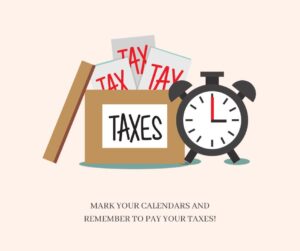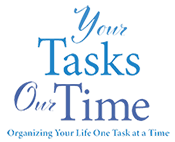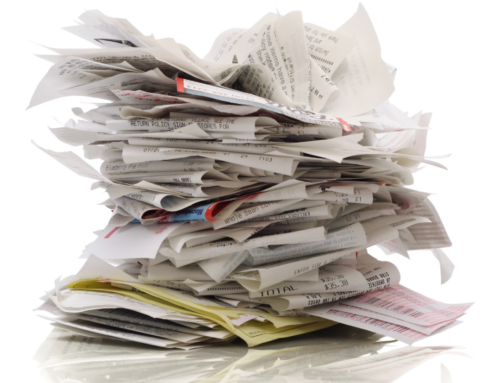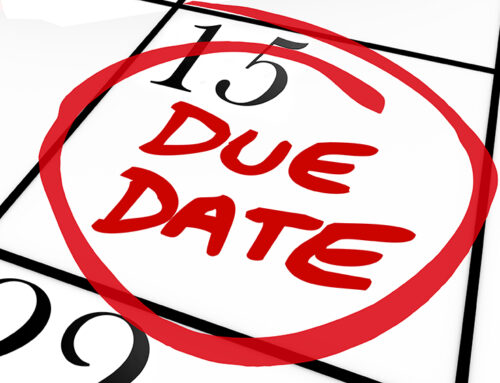The Challenge of Tax Receipts
 One of the most confusing parts of getting ready for tax time is knowing what documents you need to prepare your taxes. Basically the documents break down into three categories. Income statements, deductions and receipts.
One of the most confusing parts of getting ready for tax time is knowing what documents you need to prepare your taxes. Basically the documents break down into three categories. Income statements, deductions and receipts.
The Challenge of Receipts
Receipts are the most challenging documents to store and organize. This is especially true if you are a small business owner. Receipts are your main protection if the IRS decides to audit and details are critical. It’s imperative to keep all receipts pertaining to business and a very good idea to get into the habit of making notes on entertainment and dining expense receipts.
Simple Receipt Storage Solutions
I personally love a simple accordion file folder with 13 or more slots for filing my receipts. It’s important to make sure your file folder has enough slots to accommodate all the tax categories you need. At the end of the year I make sure all the receipts within a given category are organized by date, then I hand the entire folder over to my accountant. I actually have two of these that I rotate yearly, so I always have one working receipt folder available. I keep a designated area in my wallet for my business receipts and simply file the receipts in my file folder when the area in my wallet is full.
Consider Scanning for Added Protection
Scanning your receipts can help solve two problems. First, if IRS comes knocking, they won’t care that your receipts from four years ago have faded; so scanning receipts is a great way to give you that added layer of protection. Secondly, if you set up a system to scan as you go using your phone, then you won’t have to wonder where all your receipts are stored and you won’t have to deal with that shoebox full of papers come tax time. There are many smartphone apps dedicated to receipt scanning that are easy to use and can save you hours of searching, sorting and organizing papers during tax time.
List of Needed Tax Documents
Income Statements:
- W-2 – wages and salary
- W-2G – gambling winnings
- Form 1099-R – retirement income
- Form 1099-INT – interest
- Form 1099-DIV – dividends
- Form 1099-MISC – miscellaneous income, including self-employment
- Form 1099-G – government payments
- Form 1099-SA – MSA or HSA distributions
- Form 1099-B – broker or barter exchanges
- Form SSA-1099 – Social Security benefits
- Form RRB-1099 – railroad retirement
- Schedule K-1 – partnership income or loss
- Other sources of income, such as jury duty pay, gambling winnings and cancellation of debt
- Cryptocurrency transactions
- Alimony payments
Self-Employment and Business Records:
- Form 1099-NEC
- Form 1099-K
- All records of business income and expenses
- Mileage
- Business assets to be depreciated
- Home office expenses
Deductions:
- Form 1098 – mortgage interest
- Form 1098-E – student loan interest
- Form 1098-T – tuition
- Out of pocket medical expenses
Receipts & Records:
- Unreimbursed mileage related to work or volunteering
- Charitable donations
- Contributions to retirement plans
- Healthcare expenses
- Self-employment income and expenses, including any:
- Home-office expenses
- Health-insurance premiums paid
- Transportation costs
- Advertising fees
- Rental property
- Moving expenses, if you moved for a new job
- Expenses for energy-efficient home improvements
- Tuition or fees paid for education for you, spouse, or dependents
- Retirement account rollovers
- Child care and dependent care expenses, including the employer identification number (EIN) or SSN of the care provider
Additional Documents:
- Your Social Security number (SSN) or taxpayer identification number (ITIN) and SSNs or ITINs for spouse and dependents (if any)
- Your birth date and birth date for spouse and dependents (if any)
- A copy of last year’s return
By Darla Pompilio
Your Tasks – Our Time, LLC
Documents List Source: IRS.gov, H&R Block & Forbes






